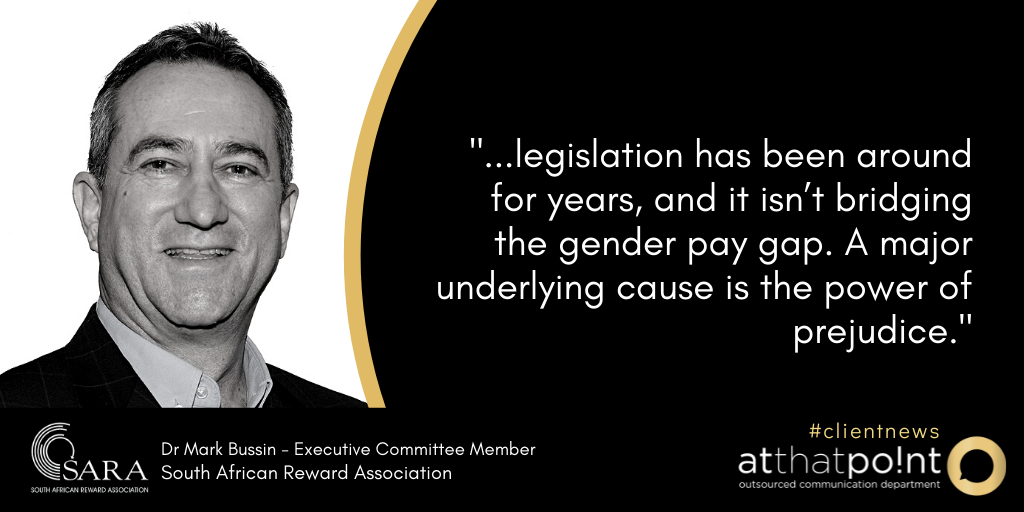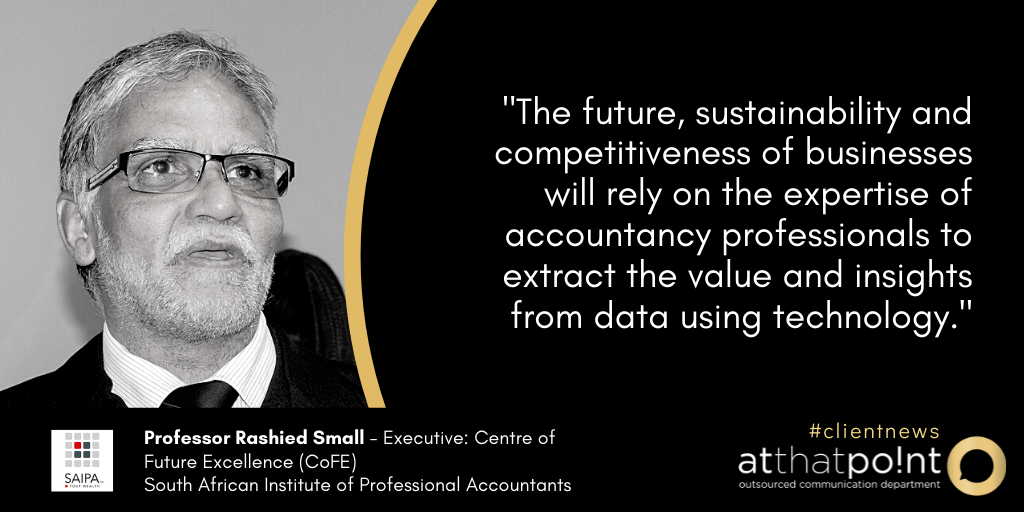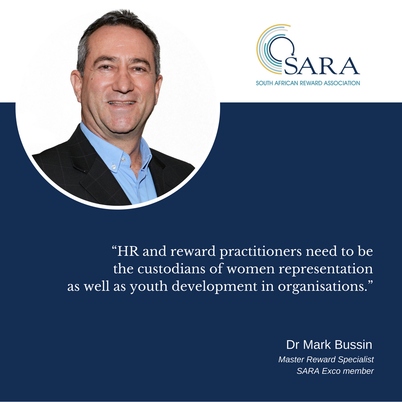 The underlying causes and current barriers of the gender pay gap are often misunderstood, says Dr Mark Bussin, Master Reward Specialist and Executive Committee Member of the South African Reward Association (SARA). With Women’s Day coming up, it is appropriate to point out that the gender pay gap in South Africa has been between 15 – 18% for many years and while South African legislation and company policies have been put in place to address the issue, the statistics aren’t changing speedily enough. “Section 6 of South Africa’s Employment Equity Act was implemented several years ago and it stipulates that companies may not discriminate in terms of remuneration; they are legally obliged to offer equal pay for work of equal value. In America and Canada, similar legislation has been around since the 1960s, but the gender pay gap in these countries still exists. Legislation isn’t solving the problem and this isn’t a uniquely South African problem,” says Bussin. Many companies have openly stated their commitment to gender pay equality and regularly review whether they are paying equally for equal work, but this isn’t having an effect on the gender pay gap either. Legislation isn’t Bridging the Gender Pay Pap “The only thing that has changed is a heightened awareness of gender pay discrimination. Company remuneration policies and legislation has been around for years, and it isn’t bridging the gender pay gap. A major underlying cause is the power of prejudice,” says Bussin. Bussin says that many prejudices exist about women in the workplace. Companies have down-sized, right-sized and are leaner than ever before, but leading recruiters and HR professionals tend to be even more wary about hiring or promoting a female candidate. Maternity leave, time spent away from work to care for children, or the possibility of a new mom deciding to not return to the workforce after childbirth, are still scenarios that are ingrained in the minds of people in power positions. This has given rise to a new term I call the “mommy gap”. Women may never catch up to men once they have had a child – the gap stays with them in perpetuity. “Unfair assumptions and scenarios such as these still count against women. Whether recruiters, HR managers and directors are open about their prejudices or not, these prejudices still exist in the back of their minds,” says Bussin. Questioning and Negotiation Adding to the challenge is that women are less likely to question the salaries that they are offered and less likely to negotiate better pay. “Recruiters and HR managers may subconsciously assume that they can pay a woman less because she might have a partner that helps support her and her household. Women, in turn, are part of the problem because they trust that the remuneration that they are being offered is fair, when they should actually be researching market related salaries as well as the company’s pay scale, and be advocating for fairer pay,” says Bussin. Bussin says that company directors should be concerned about the gender pay gap for a number of reasons. Not only can discriminatory pay be damaging to their brand, but it can negatively impact their businesses in a number of ways. “If a case about gender pay discrimination makes its way to court, the CCMA or the media, it could be very damaging to your brand. Not only do employees want to work for a company that remunerates fairly and sustainably, but it’s also good governance. It’s simply the right thing to do,” concludes Bussin. ENDS MEDIA CONTACT: Idele Prinsloo, 082 573 9219, [email protected], www.atthatpoint.co.za For more information on SARA please visit: Website: www.sara.co.za Twitter: @SA_reward LinkedIn: South African Reward Association Facebook: SARA – South African Reward Association
0 Comments
The National Income Dynamics Study – Coronavirus Rapid Mobile Survey (NIDS-CRAM) is a study tracking income, employment and welfare in South Africa. The report reveals that women have been hardest hit by the impact of COVID-19 lockdowns.
“Although survival and saving jobs is paramount, equal pay initiatives within organisations have not been forgotten,” says Dr Mark Bussin, Master Reward Specialists and Executive Committee Member of the South African Reward Association (SARA). “However, we need equity programmes that extend beyond the enterprise.” The current economic slump has affected women so badly, it has been dubbed the “shecession”. Job losses The NDIS-CRAM survey reports that, of the three million jobs lost between February and April 2020, two million had been held by women. Between April and June 2020, employment increased by 3.2% (220,000 jobs) for women and 3.5% (320,000 jobs) for men. Yet, in June 2020, women remained well behind men in returning to pre-COVID employment levels. Income support According to the study, 57% of those unemployed in June 2020 were women. However, they accounted for only 41% of TERS/UIF-TERS beneficiaries and only 34% of those were paid the Social Relief of Distress Grant (SRDG) in that month. Industries The report suggests a number of contributing factors to the high level of unemployment among women. For one, many industries with high female employee counts were forced to reduce staff during the lockdown. These include childcare, personal grooming and hospitality. Another is their being employed in jobs where working from home is not possible or not being able to work the same hours due to childcare needs. Childcare Women often bear the greater share of childcare and healthcare responsibilities in the family. After early childhood development services and schools closed under lockdown, many may have been unable to work effectively while caring for their family. Due to divorce, women are also more likely to live with children than men are. In the report, 67% of women and only 25% of men reported they were looking after children themselves. Lower earners With no chance of daycare, many families had to decide which parent would leave their job to take care of their children. Since women typically earn less than men, they are the obvious candidates. This situation is unfortunately a result of existing inequality in pay between genders. Within the enterprise Although the study acknowledged a large difference between male and female incomes before February 2020, it measured no significant increase in the gap between then and June 2020. “In my view, the pay gap has not worsened because of COVID. It is still around and still present at the same levels as before,” says Bussin. Conclusion The NDIS-CRAM study suggests that one possible solution is state-subsidised childcare at reopened schools. This will help women to increase their work hours and return to their previous earning potential. In addition, Bussin advises that organisations also need to do due diligence internally. “All organisations should conduct regular, thorough audits of all remuneration and HR practices to make sure that no poor practices or discrimination have crept in,” he says. ENDS MEDIA CONTACT: Rosa-Mari Le Roux, 060 995 6277, [email protected], www.atthatpoint.co.za For more information on SARA please visit: Website: www.sara.co.za Twitter: @SA_reward LinkedIn: South African Reward Association Facebook: SARA – South African Reward Association The prosperity and equality of the nation’s workforce – alluded to in the recent State of the Nation address by President Ramaphosa – is in large part determined by reward practitioners: professionals that advise companies on how to structure financial and non-financial pay elements to compensate employees for their work.
“Inequality was mentioned at least ten times during the address,” says Dr Mark Bussin, a Master Reward Specialist, Exco member of the South African Reward Association (SARA) and Chairperson of 21st Century. “Reward practitioners must take this seriously in their practices and policies by reporting the wage gap in annual financial statements, and finding ways to close the wage gap in companies.” Tough calls for private sector reward practitioners Reward and HR practitioners also need to step up their focus on training and education. Tough calls are necessary on employing more people through internships, and creating entrepreneurs within companies. Tougher yet will be the decision to release these successful candidates to industry in order to let the larger economy benefit from the initial training and development investment. Tough calls for public sector reward practitioners HR and reward practitioners in government will be tasked with cutting costs, cutting pay increases, and managing fruitless and wasteful expenditure across the public sector workforce. “Reward practitioners need to be steady, well informed and consistent in their approach,” says Bussin. “They also need to stand up to those that resist changes for the greater good, as well as new leaders who want sweeping changes just for the sake of it.” Tough calls for individual practitioners HR and reward practitioners furthermore need to be the custodians of women representation as well as youth development in organisations. Bussin advises reward practitioners to follow national policy in all areas including benefits, working conditions and employment practices. Reward practitioners will also have the added challenge of supporting government and business in creating increased remuneration for 6 million people. The implication of this is that practitioners focus on getting their remuneration governance right and working without any further delay. “As per our President’s closing words, all reward practitioners have a chance to make a difference right where they are by moving beyond historic practices and being willing to say “send me” to do the tough work where it is necessary.” ENDS MEDIA CONTACT: Juanita Vorster, 079 523 8374, [email protected] For more information on SARA please visit: Website: www.sara.co.za Twitter: @SA_reward LinkedIn: South African Reward Association Facebook: SARA – South African Reward Association  The underlying causes and current barriers of the gender pay gap are often misunderstood, says Dr Mark Bussin, Executive Committee Member of the South African Reward Association (SARA) and Chair of 21st Century. The gender pay gap in South Africa has been between 15 – 18% for 50 years and while South African legislation and company policies have been put in place to address the issue, the statistics aren’t changing. “Section 6 of South Africa’s Employment Equity Act was implemented two years ago and it stipulates that companies may not discriminate in terms of remuneration; they are legally obliged to offer equal pay for work of equal value. In America and Canada, similar legislation has been around since the 1960s, but the gender pay gap in these countries still exists. Legislation isn’t solving the problem and this isn’t a uniquely South African problem,” says Bussin. Many companies have openly stated their commitment to gender pay equality and regularly review whether they are paying equally for equal work, but this isn’t having an effect on the gender pay gap either. The power of prejudice “The only thing that has changed is a heightened awareness of gender pay discrimination. Company remuneration policies and legislation has been around for years, and it isn’t bridging the gender pay gap. A major underlying cause is the power of prejudice,” says Bussin. Bussin says that many prejudices exist about women in the workplace. Companies have down-sized, right-sized, and are leaner than ever before, leading recruiters and HR professionals tend to be even more wary about hiring or promoting a female candidate. Maternity leave, time spent away from work to care for children, or the possibility of a new mom deciding to not return to the workforce after childbirth, are still scenarios that are ingrained in the minds of people in power positions. “Unfair assumptions and scenarios such as these still count against women. Whether recruiters, HR managers, and directors are open about their prejudices or not, these prejudices still exist in the back of their minds,” says Bussin. Questioning and negotiation Adding to the challenge is that women are less likely to question the salaries that they are offered and less likely to negotiate better pay. “Recruiters and HR managers may subconsciously assume that they can pay a woman less because she might have a partner that helps support her and her household. Women, in turn, are part of the problem because they trust that the remuneration that they are being offered is fair, when they should actually be researching market related salaries as well as the company’s pay scale, and be advocating for higher pay,” says Bussin. Bussin says that company directors should be concerned about the gender pay gap for a number of reasons. Not only can discriminatory pay be damaging to their brand, but it can negatively impact their businesses in a number of ways. “If a case about gender pay discrimination makes its way to court, the CCMA or the media, it could be very damaging to your brand. Not only do employees want to work for a company that remunerates fairly and sustainably, but it’s also good governance. It’s simply the right thing to do,” concludes Bussin. ENDS MEDIA CONTACT: Carla Coetzee, [email protected], www.atthatpoint.co.za For more information on SARA please visit: Website: www.sara.co.za Twitter: @SA_reward LinkedIn: South African Reward Association Facebook: SARA – South African Reward Association |
Archives
March 2023
Welcome to the South African Reward Association newsroom.
Categories
All
|



 RSS Feed
RSS Feed